Are you considering the addition of a furry companion to your household, one that possesses a certain distinctive charm? Perhaps you should acquaint yourself with the elegant and lively Dalmatian breed.
With their unique coat adorned with black or liver spots against a white backdrop, Dalmatians are certainly not your everyday canine. In this discussion, we will uncover the various characteristics and traits that make Dalmatians stand out, providing you with valuable insights into this captivating breed.
So, let's embark on this journey together and discover what makes Dalmatians so special.
Key Takeaways
- Dalmatians are intelligent dogs but can also be independent and stubborn, requiring early and consistent training using positive reinforcement methods.
- Regular grooming is necessary for Dalmatians, including brushing their short and dense coat, occasional baths, and attention to their ears, nails, and dental care.
- Dalmatians are generally a healthy breed, but they are prone to certain health issues such as urinary stones, deafness, allergies, hip dysplasia, and iris sphincter dysplasia.
- When considering a Dalmatian as a pet, it is important to adapt to their high energy levels, prioritize their exercise needs, and provide early socialization to ensure good manners with other residents and compatibility with children and other pets.
Origin and History
The Dalmatian breed has a rich and fascinating history that dates back to the Dalmatia region in Croatia. These distinctive dogs were originally bred for various tasks, including guarding, herding, and even working alongside firefighters.
Their unique spotted coat and striking appearance have made them popular throughout history. Dalmatians gained widespread recognition as firehouse mascots, accompanying horse-drawn fire engines in the 1800s, where they'd clear the path and guard the equipment.
Their intelligence, loyalty, and high energy levels make them excellent working dogs. Dalmatians thrive on mental and physical stimulation, and early training and socialization are crucial to their development.
Today, Dalmatians continue to be cherished pets and are known for their playful and affectionate nature. Their history and distinctive characteristics make them a truly fascinating breed.
Size and Breed Group
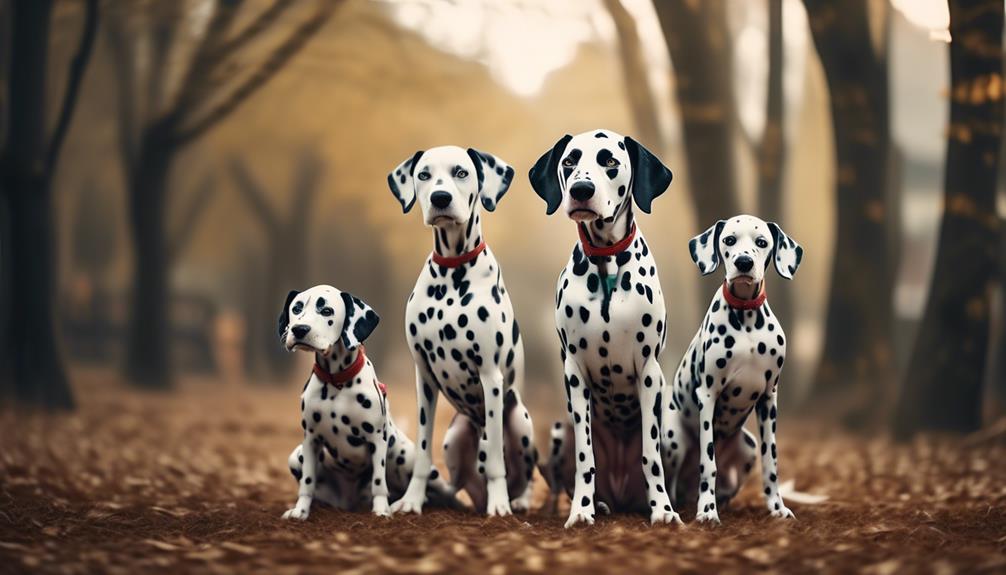
Size and Breed Group of the Dalmatian dog are important factors to consider when choosing this unique and versatile breed. Dalmatians are classified as a large breed and belong to the Non-Sporting/Utility group. This breed is known for its distinctive spotted coat and medium-sized build. Dalmatians have a strong and muscular body, standing between 19 and 24 inches tall and weighing between 48 and 55 pounds. Their size makes them suitable for various living situations, including apartments, as long as their energy levels are adequately met. Being a part of the Non-Sporting/Utility group means that Dalmatians are not specifically bred for one particular purpose, but rather have a wide range of talents and abilities. They are known for their loyalty, affection, and high energy levels. Consider their size and breed group when deciding if the Dalmatian is the right fit for you.
| Size | Breed Group |
|---|---|
| Large | Non-Sporting/Utility |
Table: Size and Breed Group of the Dalmatian dog.
Lifespan and Coat
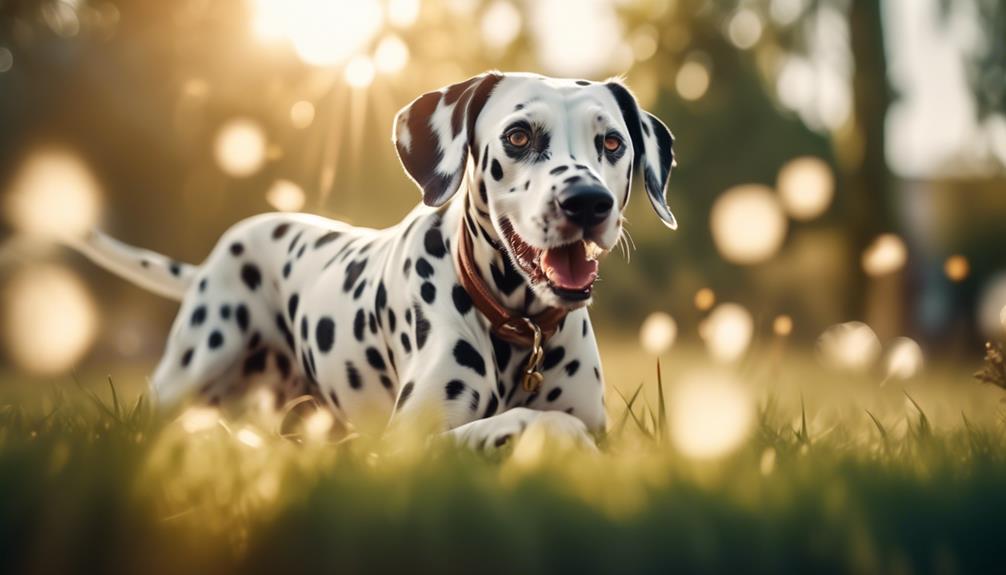
With a lifespan of 10 to 13 years, Dalmatians are known for their distinctive short and dense coat that features black or liver spots on a white background. This unique coat pattern sets them apart from other breeds and adds to their charm and appeal. The spots can vary in size and shape, creating a beautiful mosaic-like pattern on their coat.
Dalmatians require regular grooming to keep their coat looking its best. They've moderate shedding and will benefit from weekly brushing to remove loose hair and prevent matting. Occasional baths are also necessary to keep their coat clean and healthy.
Additionally, attention should be given to their ears and nails, and regular dental care is important for their overall well-being.
Dalmatian Highlights
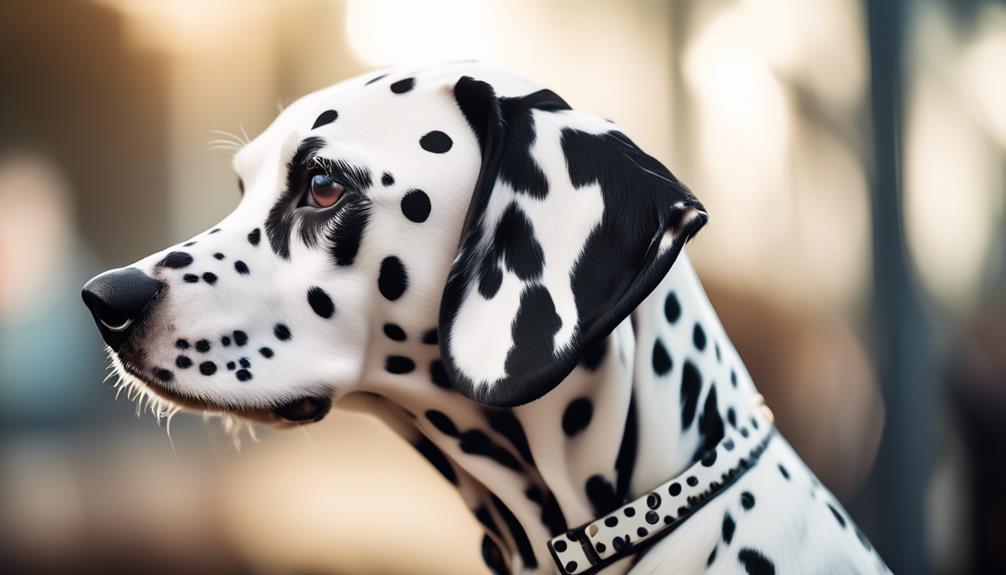
Featuring a distinctive spotted coat and medium-sized stature, Dalmatians are loyal and affectionate dogs with high energy levels, making them a delightful addition to active households. They are known for their unique coat pattern, which consists of black or liver spots on a white background. Dalmatians have a reputation for being intelligent but can also be independent and stubborn, requiring early training and socialization. To give you a better understanding of Dalmatian highlights, here is a table summarizing their key characteristics:
| Characteristic | Description |
|---|---|
| Size | Medium-sized breed |
| Coat | Short and dense with distinctive black or liver spots on white |
| Temperament | Loyal, affectionate, and desires to please |
| Energy Level | High energy levels that require regular exercise and mental stimulation |
| Training Needs | Early and consistent training using positive reinforcement methods |
| Socialization | Important to ensure they get along well with other animals and humans |
With their striking appearance and playful nature, Dalmatians can bring joy and excitement to any active household.
Training Methods
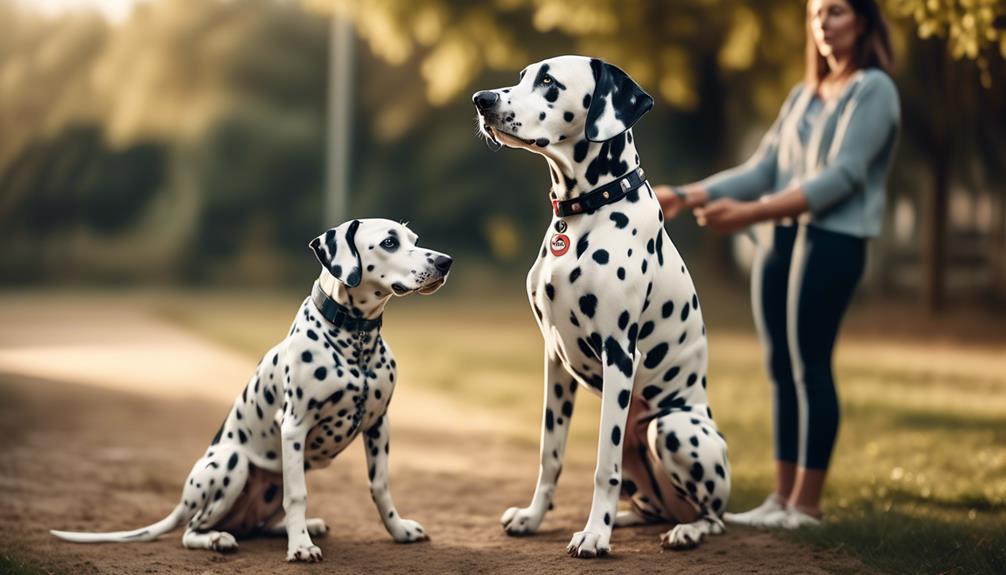
To effectively train a Dalmatian, it's important to understand their intelligence, independence, and stubbornness. These characteristics can make training a challenge, but with the right approach, you can have a well-behaved and obedient Dalmatian. Here are some training methods that can help you achieve that:
- Use positive reinforcement: Dalmatians respond well to rewards and praise. Use treats, toys, or verbal praise to motivate them during training sessions.
- Start early and be consistent: Begin training your Dalmatian as early as possible and be consistent with your commands and expectations.
- Be patient and persistent: Dalmatians can be stubborn at times, so it's important to remain patient and persistent during training.
- Provide mental stimulation: Dalmatians are intelligent dogs and need mental stimulation to prevent boredom. Incorporate puzzle toys or interactive games into their training routine.
- Seek professional help if needed: If you're having difficulty training your Dalmatian, don't hesitate to seek the assistance of a professional dog trainer who specializes in positive reinforcement methods.
Early Training Importance
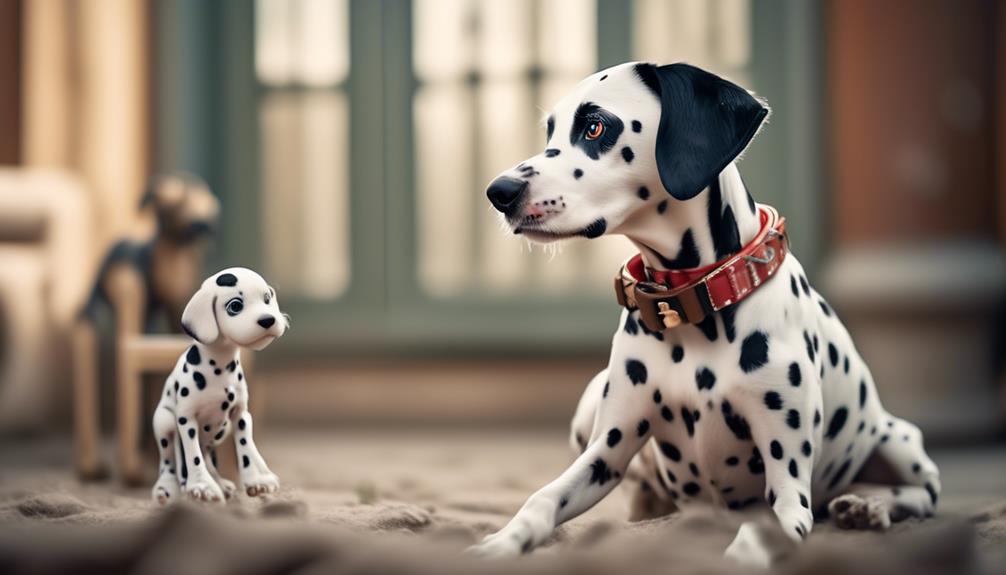
Early training is crucial for the development and well-being of a Dalmatian, as it sets the foundation for their behavior and obedience throughout their lives. Dalmatians are intelligent dogs but can be independent and stubborn. Positive reinforcement training methods work best, using treats, praise, and rewards to motivate them. Consistency is key, starting from a young age. By establishing clear rules and boundaries, you can help shape your Dalmatian into a well-behaved and obedient companion. Early training also includes socialization, exposing your Dalmatian to various people, animals, and environments to help them become confident and well-adjusted. To provide a comprehensive understanding of the importance of early training, here is a table outlining the benefits:
| Benefits of Early Training for Dalmatians |
|---|
| Builds a strong bond between owner and dog |
| Helps prevent behavioral problems |
| Teaches essential commands and manners |
Grooming Needs
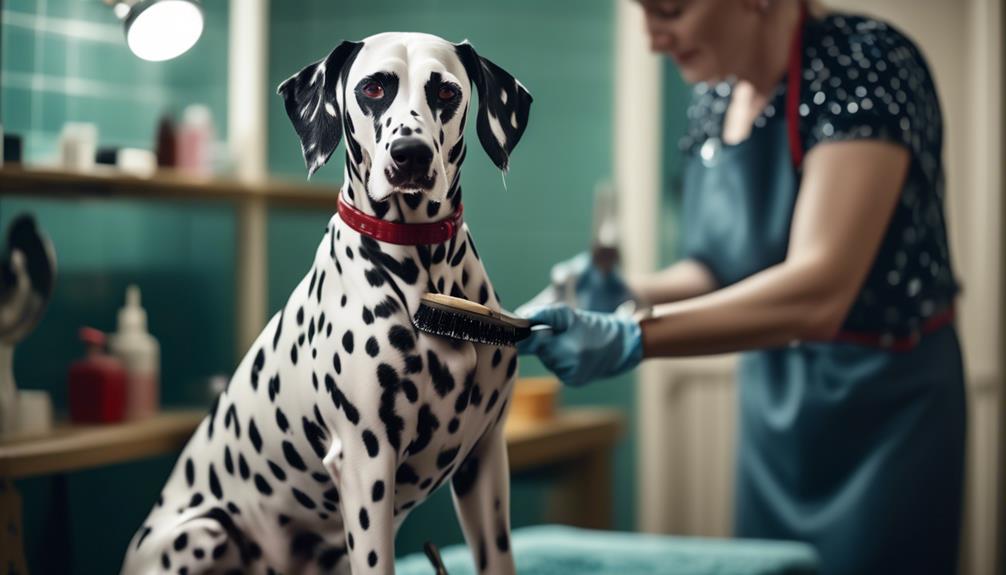
Now let's focus on the grooming needs of Dalmatians, ensuring that their distinctive coat remains healthy and looking its best. To keep your Dalmatian looking fabulous, here are some important grooming tips to follow:
- Regular brushing is essential for Dalmatians, as they have a short and dense coat that can shed moderately. Brushing helps to remove loose hair and keep their coat in good condition.
- Occasional baths are necessary to keep your Dalmatian clean and smelling fresh. Use a gentle dog shampoo and make sure to thoroughly rinse their coat.
- Pay attention to their ears and nails. Clean their ears regularly to prevent infections, and trim their nails regularly to avoid overgrowth and discomfort.
- Dental care is important for Dalmatians. Brush their teeth regularly and provide dental treats or toys to maintain good oral hygiene.
- Lastly, visit the vet regularly for check-ups and vaccinations to ensure your Dalmatian's overall health and well-being.
Health and Care Tips
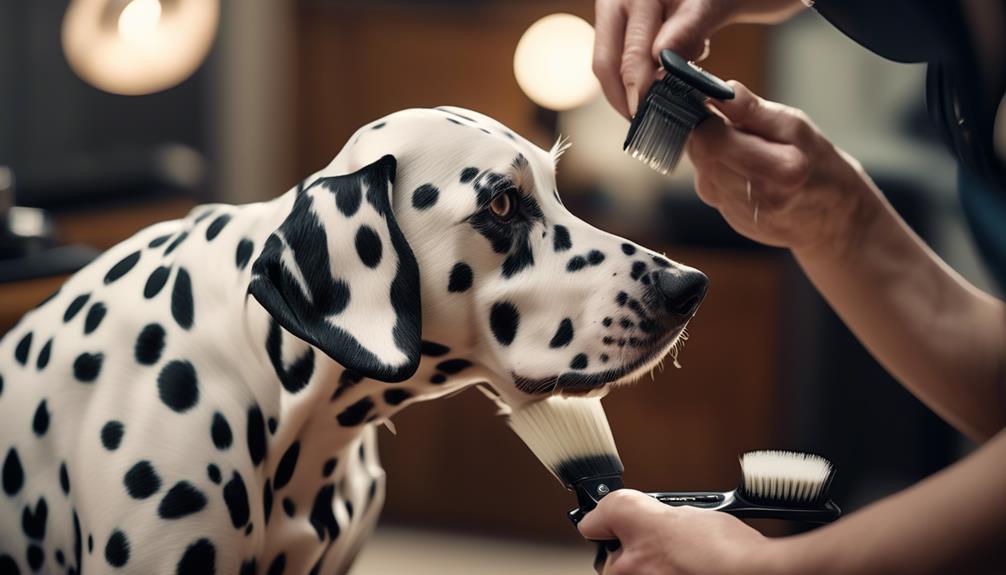
What are some important tips for ensuring the health and care of your Dalmatian? Taking care of your Dalmatian's health is crucial for their overall well-being. Here are some important tips to keep in mind:
| Tips for Health and Care | |
|---|---|
| 1. Regular Exercise | Dalmatians are high-energy dogs that require regular exercise to stay healthy and happy. Make sure to provide them with daily physical activities such as walks, runs, or playtime in a secure area. |
| 2. Proper Diet and Hydration | It is essential to feed your Dalmatian a balanced diet that meets their nutritional needs. Additionally, ensure they have access to fresh water at all times to prevent dehydration. |
| 3. Regular Veterinary Check-ups | Schedule regular check-ups with your veterinarian to monitor your Dalmatian's health. This will help detect any potential health issues early on and ensure they receive the necessary care. |
Common Health Problems
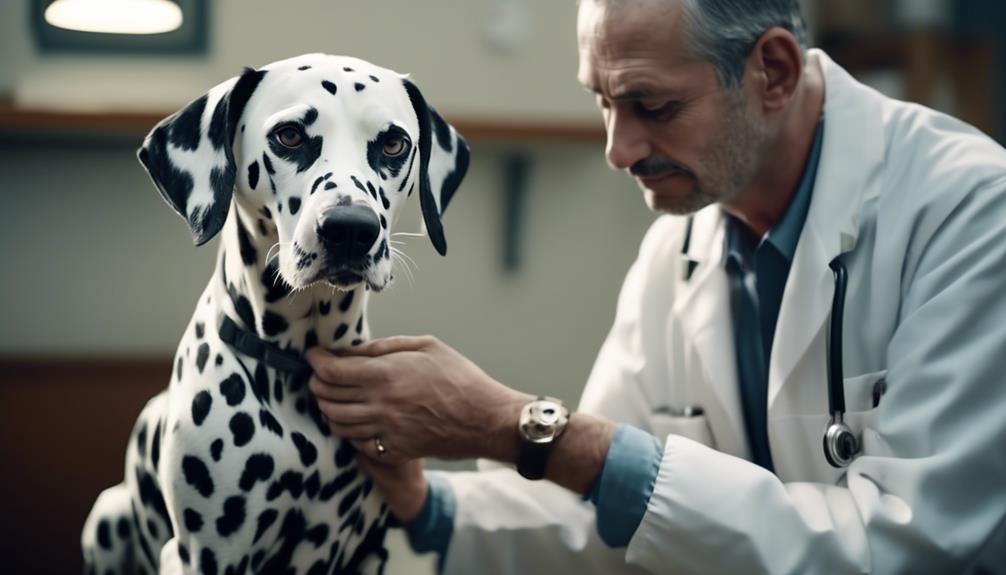
One of the important aspects to consider when caring for a Dalmatian is being aware of the common health problems that can affect this breed. Here are some of the common health problems that Dalmatians are prone to:
- Deafness: Dalmatians have a high incidence of congenital deafness, which can affect one or both ears.
- Urinary Stones: Dalmatians have a genetic predisposition to forming urinary stones, so it's important to provide them with a proper diet and access to fresh water.
- Allergies: Dalmatians can be prone to allergies, which can manifest as skin irritations or respiratory issues.
- Hip Dysplasia: This is a condition where the hip joint doesn't develop properly, leading to pain and mobility issues.
- Iris Sphincter Dysplasia: This is a condition where the muscles in the iris don't function properly, leading to vision problems.
Being aware of these common health problems can help you take the necessary steps to keep your Dalmatian healthy and happy. Regular vet check-ups and a well-rounded care routine can go a long way in preventing and managing these issues.
Adaptability to Living Spaces

Dalmatians are highly adaptable dogs that can thrive in various living spaces, making them a versatile choice for both apartment dwellers and those with larger homes.
Despite their size, Dalmatians are known for their ability to adapt to smaller living spaces. However, it's important to consider their energy levels and exercise needs. Dalmatians are high-energy dogs that require regular physical activity to prevent boredom and destructive behavior.
While they can adapt to apartment living, it's crucial to provide them with enough exercise and mental stimulation. On the other hand, Dalmatians can also adapt well to larger homes with plenty of space for them to run and play.
Ultimately, Dalmatians can thrive in different living environments as long as their exercise and mental stimulation needs are met.
Prey Drive and Vocalization
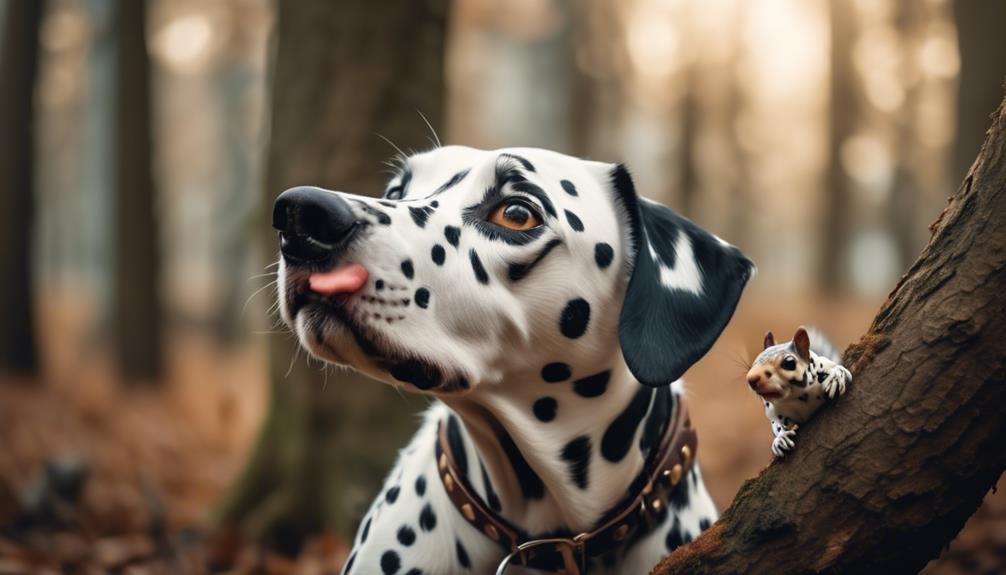
As we continue our exploration of Dalmatians, it's important to understand their natural instincts and vocalization tendencies. These characteristics play a crucial role in their behavior and can greatly impact their suitability as a pet. Here are some key points to consider:
- Prey Drive: Dalmatians have a strong prey drive, which means they've a natural instinct to chase and pursue small animals. This can lead to dangerous situations, especially if they aren't properly trained and controlled.
- Vocalization: Dalmatians are known to be vocal dogs. They've a tendency to bark and howl, especially when they're bored or anxious. It's important to provide them with mental and physical stimulation to prevent excessive vocalization.
- Training: Early and consistent training is essential to manage their prey drive and vocalization tendencies. Positive reinforcement methods work best to motivate and engage them.
- Exercise: Dalmatians are high-energy dogs that require plenty of exercise to satisfy their natural instincts. Regular physical activities such as long walks, runs, and play sessions are necessary to keep them mentally and physically stimulated.
- Socialization: Proper socialization from a young age is crucial for Dalmatians to develop good manners and control their instincts. Exposing them to different environments, people, and animals will help them become well-rounded and well-behaved companions.
Understanding these aspects of Dalmatians' behavior will help you provide the right training, exercise, and socialization to ensure a happy and harmonious relationship with your furry friend.
Wanderlust Potential and Exercise Needs
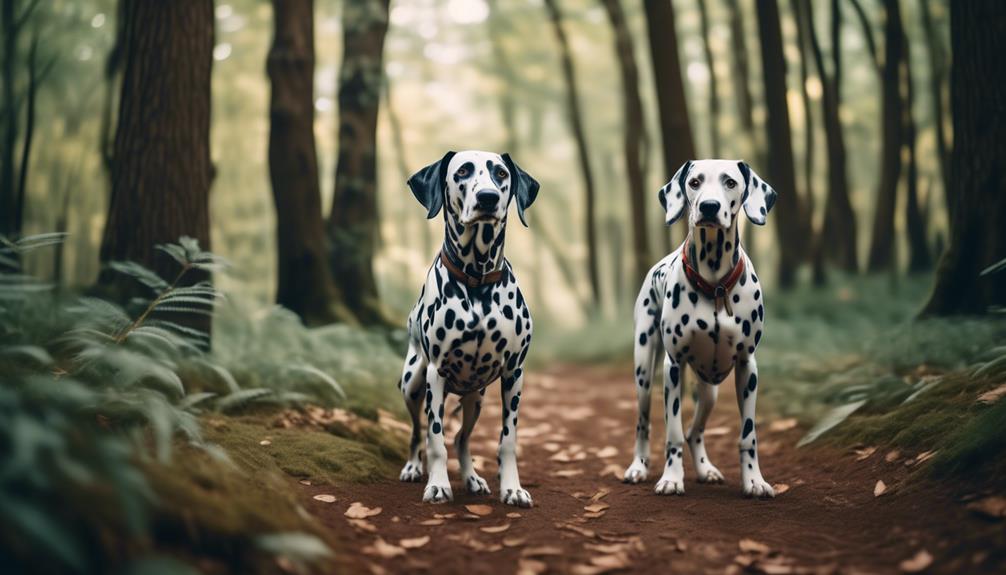
To ensure a happy and well-adjusted Dalmatian, it's crucial to understand their wanderlust potential and meet their exercise needs.
Dalmatians are a high-energy breed that requires ample exercise to stay physically and mentally stimulated. They've a moderate to high wanderlust potential, meaning they may have a strong desire to roam or explore if not properly exercised and supervised.
It's recommended to provide them with daily activities such as long walks, runs, or play sessions in a secure area. Mental stimulation, such as puzzle toys and obedience training, is also important to keep their intelligent minds engaged.
Neglecting their exercise needs can lead to behavioral issues such as hyperactivity and destructive behavior. Therefore, it's essential to provide Dalmatians with regular exercise to ensure their well-being and prevent any potential problems.
Intensity and Playfulness Levels
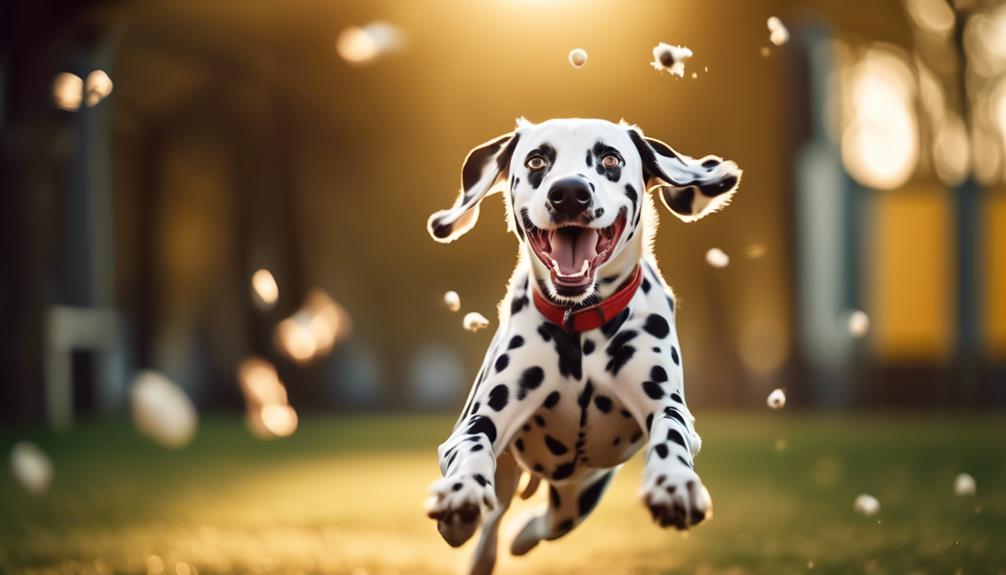
Dalmatians are known for their high energy levels and playful nature. They have a lot of energy and require regular exercise to keep them happy and healthy. They love to play and engage in activities such as fetch, frisbee, and agility training. Dalmatians have a strong prey drive and may chase small animals, so it's important to provide them with a secure and fenced-in area to play. Their playfulness extends to interactions with their human family members, and they thrive on attention and interactive play sessions. Dalmatians can be intense in their play, so it's important to supervise their interactions with children and other pets to ensure everyone stays safe. Understanding the intensity and playfulness levels of Dalmatians will help you provide them with the appropriate amount of exercise and playtime to keep them happy and well-balanced.
Personality and Socialization
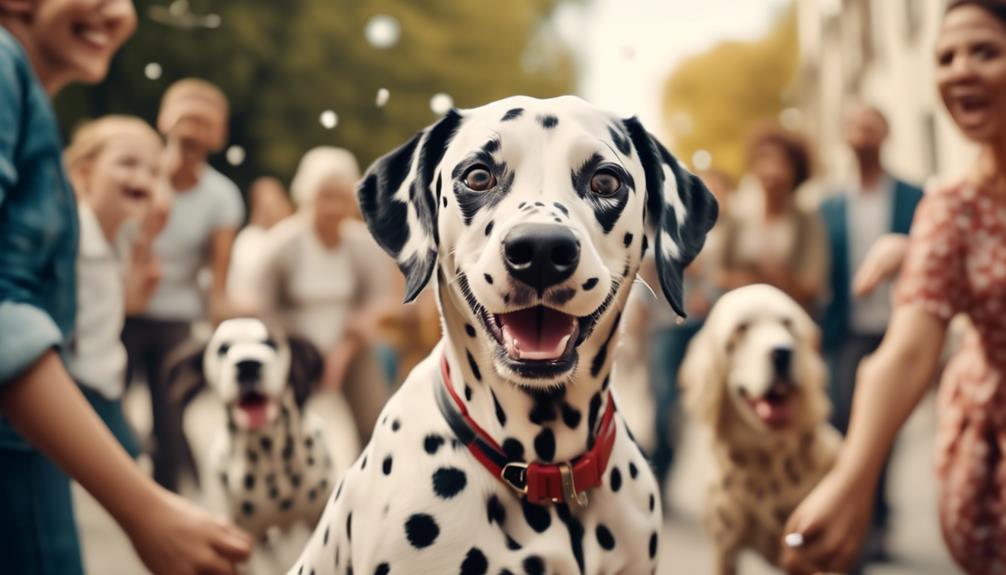
Dalmatians are renowned for their vibrant personalities and the importance of early socialization in shaping their behavior. These dogs are known to be high-energy, intelligent, and eager to please. They have a sense of humor and are often described as being alert and lively.
Early socialization is crucial for Dalmatians to ensure they grow up to be well-rounded and well-behaved dogs. It helps them develop good manners and enables them to get along with other dogs and cats. Dalmatians can make excellent playmates for older children but may need supervision around younger ones due to their energy levels.
With proper socialization and training, Dalmatians can become loyal and affectionate companions who thrive in a loving and stimulating environment.
Finding Reputable Breeders and Rescue Organizations
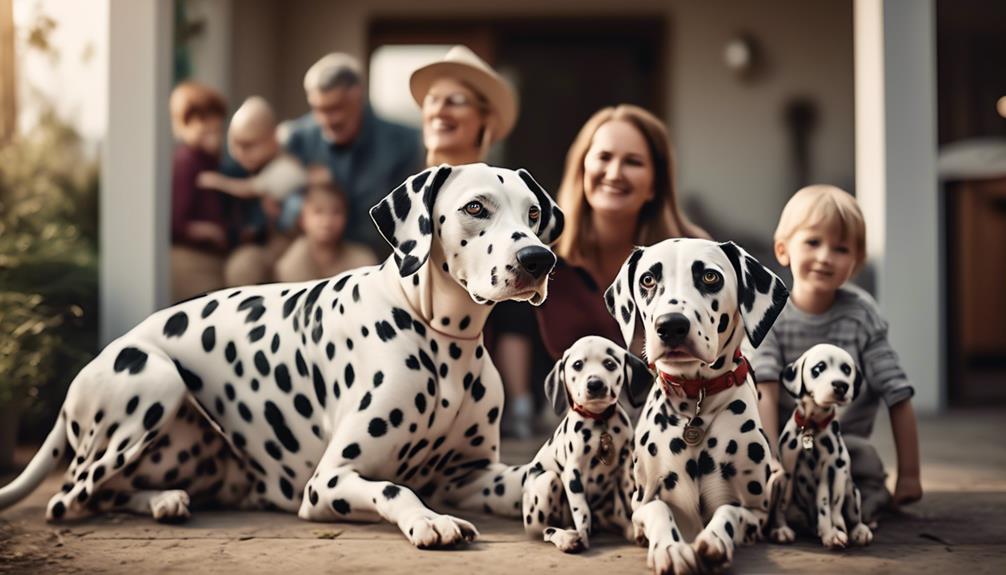
When searching for reputable breeders and rescue organizations for Dalmatians, it's essential to conduct thorough research and make informed decisions to ensure the well-being and integrity of the breed.
Here are some guidelines to help you in your search:
- Look for breeders who are registered with reputable kennel clubs or breed organizations.
- Visit the breeder's facility to assess the conditions in which the dogs are kept and determine if they're well-cared for and socialized.
- Ask the breeder for health clearances and documentation of genetic testing to ensure that the puppies are free from common health issues in the breed.
- Seek recommendations from other Dalmatian owners or breed enthusiasts for reputable breeders they've had positive experiences with.
- Consider adopting a Dalmatian from a rescue organization. Rescue organizations often have Dalmatians of various ages available for adoption and can provide valuable information about the dog's temperament and behavior.
Frequently Asked Questions
Are Dalmatians Suitable for Families With Young Children?
Yes, Dalmatians can be suitable for families with young children. They are generally good playmates for older kids and, with early socialization, can get along well with other dogs and cats.
How Much Exercise Do Dalmatians Need on a Daily Basis?
Dalmatians need a lot of exercise, ideally around 60 minutes of physical activity every day. They are a high-energy breed that loves to run and play, so be prepared for lots of outdoor adventures!
Can Dalmatians Be Left Alone for Long Periods of Time?
Dalmatians should not be left alone for long periods of time. They are highly social dogs and require companionship and mental stimulation. Leaving them alone for extended periods can lead to boredom and potential behavior problems.
Are Dalmatians Good Guard Dogs?
Yes, Dalmatians are good guard dogs. With their alertness, loyalty, and protective nature, they can make excellent watchdogs. Their distinctive appearance also serves as a deterrent to potential intruders.
Do Dalmatians Have a Strong Prey Drive?
Yes, Dalmatians have a strong prey drive. They are known for their instinct to chase and pursue small animals. It's important to be aware of this characteristic and take proper precautions to keep them safe.
What Are the Differences Between Dalmatians and Doxiepoos in terms of Characteristics and Temperament?
Doxiepoos are a mix of Dachshund and Poodle, known for their friendly and lively nature. They are highly affectionate and make great family pets. On the other hand, Dalmatians are energetic and independent dogs with a strong prey drive. Both breeds have distinct characteristics and temperaments. For more pictures and facts about doxiepoo, refer to reputable sources or breed-specific websites.
Conclusion
In conclusion, the Dalmatian breed offers a unique and lively addition to any family. Their striking coat and distinctive characteristics make them stand out from the crowd.
However, their high energy level and stubborn nature require early training and socialization. By understanding their needs and providing proper care, you can enjoy a happy and harmonious life together.
So, why wait? Consider adding a furry friend to your family and embark on an exciting journey with a Dalmatian by your side. They'll surely light up your world like a constellation of stars.




